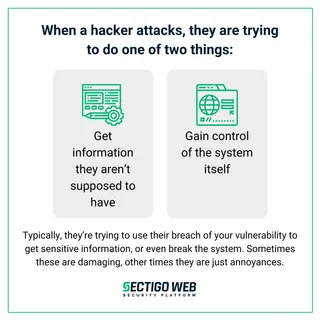How can a person inject a malicious script into a website?


Malicious script injection is one of the most common ways hackers compromise websites. Learn how these attacks work, what makes your site vulnerable, and how tools like SiteLock help you stay protected through automated malware scanning, vulnerability detection, and more.

We all know that hackers and bad bots are all over the internet. Websites get hacked every single day by cybercriminals who take over systems and websites for their own illicit purposes. But if you’ve never written a line of code in your life and you simply want to avoid attacks on your own website, then you may not know a thing about how these attacks happen – or how your own site could be vulnerable.
If you run a website, security needs to be one of your top priorities. If a hacker gains access to your site, your life’s work could be ruined and your user’s data and privacy is put at risk.
To fight against malicious scripts, malicious software (malware), and different types of attacks, you need to understand how they are carried out.
Let’s start with the concept of a vulnerability.

What is a vulnerability?
In your house, you keep all your doors and windows locked. But one of your windows doesn’t latch all the way. It looks locked from the outside, but if someone realizes that it can still open, then they can still have access to your house.
This would be a vulnerability in your house.
For a website, a vulnerability is a weakness in your system. This weakness in protection can be taken advantage of and used to attack a site or web application through different attack methods such as malicious script injection.
When a hacker attacks, they are trying to do one of two things:
- Get information they aren’t supposed to have, or
- Gain control of the system itself.
If they achieve the second outcome, then they could potentially access top-level privileges, and even lock the website owner out of the site.
Typically, they’re trying to use their breach of your website security to get sensitive information, or even break the system. Sometimes these are damaging, other times they are just annoyances.
But all of them need to be dealt with.
An example of an attack on your website
If you have a website that runs JavaScript – and many of us do – then you might be privy to attacks from time to time.
This is because JavaScript attacks are effective.
If a hacker is able to sneak into your JavaScript code and plant a little bit of their own code onto a public web page, then they might be able to access a tremendous amount of information – and even capabilities that they shouldn’t.
They could sneak malicious code into your website files that can grab your information or your visitors’ information, or they can even redirect your users to another malicious website. They could duplicate your site and make it appear as though your user has to re-enter sensitive financial information.
And just like that, with a little line of code, your user just had their identity stolen.
How can you prevent these types of attacks?
The best way to prevent scripts from being installed on your website is by keeping everything updated. The developers behind your website software, content management software, and plugins should always be on the lookout for new vulnerabilities that hackers are trying to pry into and releasing updates to protect you from these vulnerabilities.
When you install the updates, they close off those vulnerabilities – just like locking that troublesome window in your house.
From there, using a comprehensive website cybersecurity software would be a great next step. SiteLock, a Sectigo company, offers a comprehensive, one-click solution to the problem of widespread malicious activity.
SiteLock automatically removes different types of malware and infections from your site and your site’s databases without taking down your website or interrupting your users. Each plan comes with daily malware scanning, website backups, vulnerability detection, SSL scans, SQL injection scans, and more. For added protection, they also offer plans with website firewall solutions and CDN services. SiteLock works hard to protect your site and your users from sneaky and effective tactics.
The last thing you want is to leave yourself or your users open to attacks from malicious scripts being injected into your website’s code. Lock your “windows” with a good malware scanner and keep your site updated, and you can feel confident that you have taken every reasonable measure to prevent unwanted attackers from gaining access to your system and your information.